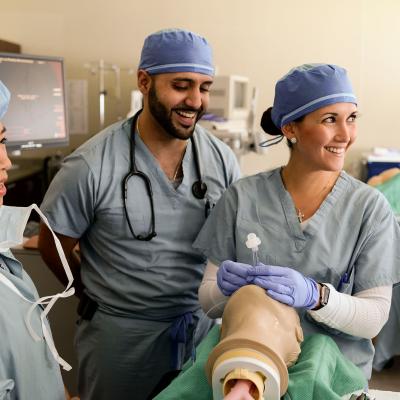- AdventHealth University

Today’s healthcare system is a large, complex industry that’s only getting bigger. The U.S. Bureau of Labor Statistics (BLS) reports that demand for healthcare jobs is expected to grow 14% by 2028, leading to an additional 1.9 million jobs in the field.
These jobs can take many forms: doctors and nurses who diagnose illnesses and prescribe treatments, community health professionals who promote healthy living in certain geographic areas, or public health professionals who work to improve the health of a population at large. While these roles differ, they all work toward preventing disease and promoting wellness.
Public health and community health professionals may not work with patients directly, but they play an important role in creating healthcare plans and awareness campaigns. Previous healthcare experience can be an asset in these careers, but healthcare workers interested in public health or community health should consider an advanced degree if they want to succeed in one of these fields. Before deciding if healthcare administration is the right path, it’s important to understand the difference between public health and community health.
Definitions of Public Health and Community Health
The CDC Foundation defines public health as “the science of protecting and improving the health of people and their communities.” Public health professionals work to prevent the spread of illness in a particular population, which can be as small as a single neighborhood or as large as an entire country. Their work is largely preventive, as they take steps to ensure that a population has clean food and water, and design informational campaigns to teach the public about health and wellness.
However, preventive action is not all that public health professionals do. They also work to understand the spread of disease in certain populations, particularly after a health-related outbreak. By studying the patterns of various diseases and how they can affect a population, public health professionals provide vital information to key decision-makers, both in the healthcare sphere and in government. In this way, public health plays a vital role in making sure that a population is as healthy as possible.
Community health has a similar goal, but takes a slightly different approach to keeping a population healthy. Instead of studying diseases directly, community health focuses on how factors such as socioeconomic hardship and cultural standards affect overall health. The work of community health professionals, according to the Centers for Disease Control and Prevention (CDC), “helps to reduce health gaps caused by differences in race and ethnicity, location, social status, income, and other factors that can affect health.” Often, they design health education programs to reach communities and encourage healthy behaviors.
Understanding the Difference Between Public Health and Community Health
Because public health and community health share the same ultimate goal, some of their efforts are similar. For example, professionals in both fields may be involved in developing health education programs or health plans. However, the greatest difference between the two fields lies in their respective focuses: Public health focuses on the scientific process of preventing infectious diseases, while community health focuses more on the overall contributors to a population’s physical and mental health.
Another major difference between public health and community health is where these professionals tend to work. In the United States, most public health initiatives fall under the jurisdiction of federal departments of public health, such as the CDC or the Food and Drug Administration. Many public health professionals work in offices and laboratories with local or state health departments, hospitals, and colleges and universities. By contrast, community health professionals often work on a more localized scale, from state and county jobs to local hospitals (though some community health professionals also work at the CDC).
Careers in Public and Community Health
What kind of careers are available to those interested in public health or community health? Many options await graduates with healthcare experience, an advanced education and a desire to help others live healthy lives.
Those interested in public health’s scientific aspects can pursue jobs such as:
- Epidemiologist (a scientist who studies disease outbreaks)
- Public health engineer (a professional who ensures that healthcare infrastructure and equipment are properly designed)
- Biostatistician (a scientist who uses math and statistics to help plan public health initiatives)
Those more interested in policy development and legislation can pursue careers such as:
- Medical writer (a writer who creates documents, such as press releases and educational materials, to promote health policies)
- Health promotion program coordinator (a manager who oversees the development of public health programs)
- Hospital administrator (a healthcare center manager who works to coordinate healthcare programs at a facility)
Students interested in community health also have numerous options and can work for various health-related organizations following graduation. Some common community health careers include:
- Health coach (a mentor who helps promote wellness and healthy living, either as a private business or through a healthcare facility)
- Community health worker (a professional who works to improve population health — particularly those who’ve been historically underrepresented — through outreach, education and community advocacy)
- Healthcare analyst (a professional who evaluates medical data to better understand and improve local hospitals and other healthcare centers)
Advance Your Healthcare Career Today
If you have experience in the healthcare field and want to take your career to the next level, consider earning your Master of Healthcare Administration in Strategy and Innovation (MHA-SI) at AdventHealth University Online. Our program will provide you with the necessary skills for a successful career in public health or community health, from scientific research to strategy development, healthcare marketing or population health management. Our online courses enable you to pursue an education on your own schedule, so you can work toward an advanced degree while maintaining your everyday life.
Whether you have an associate degree or a bachelor’s degree, AdventHealth University Online can help you to earn your master’s, enhance your career and promote positive health on a large scale. Contact the university to learn more about our MHA-SI program today.
Recommended Reading
What Do Healthcare Administrators Do?
Healthcare Administration: Salary, Careers, and Education
6 Important Figures in U.S. Healthcare
MHA vs. MBA: What Are the Differences?
Sources
AdventHealth University Online, Your Career
CDC Foundation, “What Is Public Health?”
Centers for Disease Control and Prevention, Community Health
Forbes, “Are Health Plans the Future of Public Health?”
HealthITAnalytics.com, “How Do Population Health, Public Health, Community Health Differ?”
The New York Times, “What the Experts Want Us to Know About Public Health”
U.S. Bureau of Labor Statistics, Healthcare Occupations


